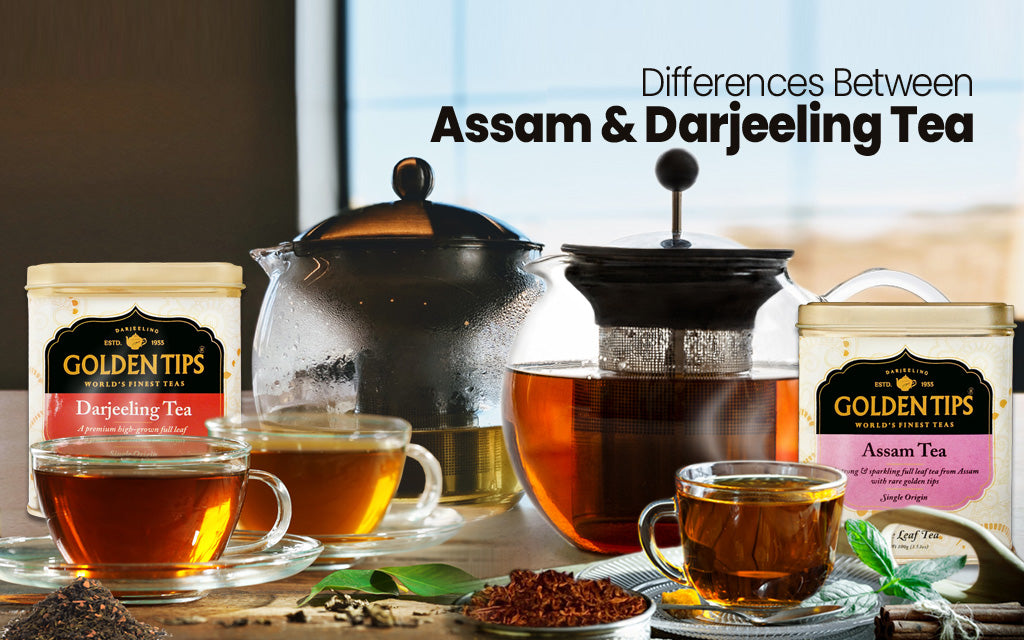
Assam Tea or Darjeeling Tea? Understanding the Difference
Despite its immense popularity in India, tea was initially brought to the subcontinent by the British. The local people quickly adopted the beverage into their lifestyles and today have become the leading producers of tea, specializing in various kinds of blends and leaves, including black teas, green tea, oolong tea, and masala chai.
Tea leaves get their name from the area in which they are grown. The two most popular tea cultivating regions are Assam and Darjeeling, famous for their authentic tea leaves with their distinctive flavor and fine aroma. Although both tea regions are next to each other, there are subtle differences in the flavor of both types of teas owing to the different altitudes and cultivation processes used.
Let us dive into the differences between Assam tea and Darjeeling tea in greater detail:
Assam Tea
Assam lies towards the northeast of Bengal and shares the same climate as South East Asia. The weather in Assam has loamy soil, lots of rainfall, and hot temperatures. These favorable conditions have made Assam one of the most productive tea regions in the world.

English Breakfast Tea - Tin Can
Initially known as Breakfast Tea, English breakfast is....
View Price
Assam Kadak Chai, Spicy Masala Tea Blend
An outstanding and rare second flush Assam Orthodox tea meant....
View PriceDarjeeling Tea
Darjeeling is more popular than Assam and has particular weather and terrain conditions. These specific conditions result in Darjeeling tea having its unique muscatel flavor. In fact, most tea connoisseurs describe Darjeeling tea as the ‘champagne of all teas.’ In all, there are over 80 tea estates in Darjeeling. Together they cover an area greater than 17500 hectares and produce well over 9 million kg of tea.

Pride Of Darjeeling - Rare First Flush Tea
An outstanding and rare First Flush Tea packed in a....
View PriceThe Two Main Differences Between Assam Tea and Darjeeling Tea
i) Climate
Assam has shorter winters and hot, humid summers with exhaustive rainfall. This type of climate is perfect for tea cultivation. By comparison, Darjeeling has a smaller area with harsher and colder weather, which slows down the growth rate of tea. This makes it difficult to grow tea, but when it does grow, Darjeeling clearly does a better job in terms of quality, aroma, and flavor.
ii) Harvest
Assam has three harvest seasons, namely the first flush, second flush, and autumn flush. There is also a monsoonal variety that is produced just after the summers once the rainfall starts. Teas in the Assam first flush have a fresh, flowery, fragrant character with golden hues. The teas in the Assam second flush have a malty, spicy character with deep brown hues. Whereas the Assam autumn flush produces less fine teas with lighter liquors.
Darjeeling tea benefits from four harvest seasons – first flush, second flush, third flush, and autumn flush.
Teas in the first flush have a delicate floral flavor and are high in polyphenolic content that displays a small degree of astringency due to the colder weather. The tea leaves do not reach high levels of oxidation.
Teas in the second flush are more mature, fruity, and muscatel in flavor. The majority of produce from Darjeeling comes from the second flush.
Teas in the third flush are harvested after heavy rainfall in September. They have a deep color with stronger flavors. Thanks to the heavy rain and abundant heat, the tea leaves grow rapidly.
Teas in autumn flush have large leaves that yield naturally fruity flavors that are rich and smooth.
Golden Tips Tea has the most extensive variety of authentic, high-quality teas from India to help you grow your tea collection.
Click here to select from our best selling teas.
















